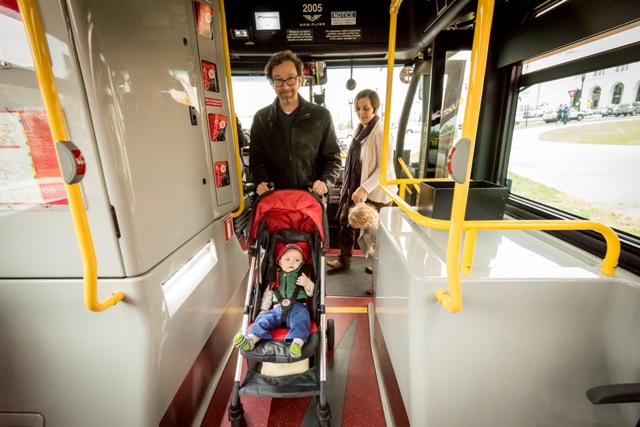Babies and moms are welcome on buses in Washington, D.C. — but strollers still must be folded up.
You do the math: breaking down a stroller takes two hands, and that leaves none to hold the baby. That's why Olga Cano, a 38-year-old mother, has been circulating a petition, signed by 18,000, that would allow D.C. parents to bring their strollers aboard Metrobuses. The need for change is obvious: WAMU followed Cano on a recent commute as she struggled with her two daughters, ages 3 and nine-months.
In the video, the trio boards the local bus, with the kids piled into a double stroller. The driver lowers the ramp, but then the driver instructs Cano to break down the stroller.
"Because I have two kids I can't, you know, manage," she tells the driver, as she leaves the bus for a 15-minute hike to the Metro station.
Last year, a mom told the Washington Post about standing on the curb crying, after a Metro bus refused to let her board with her 3-month-old son.
Stories like that, and Cano's petition drive, have forced D.C. Metro officials to say they're rethinking the policy, WAMU reported. The agency allows them already aboard its circulator routes, which run limited service in the city center.
More and more transit agencies are reconsidering bans on open strollers these days. Seattle's King County Metro changed its policy in 2015 to allow children in open strollers in the securement area, provided there isn't a person with disabilities using it. Chicago's CTA began allowing open strollers in 2003 in the area reserved for passengers with disabilities, if the space is available.
The transition hasn't been without its hiccups, however. People complain about having to give up their seats in Chicago, especially at rush hour. And parents complain about being asked to fold their strollers at rush hour.
But making transit more family friendly is good policy, says Ben Fried, a former Streetsblog editor who is now with TransitCenter.
"We recommend that agencies allow strollers on buses without folding and that they designate open stroller areas on buses that don’t subtract from space for seniors and people with disabilities," he said. "If buses are so crowded that an open stroller area feels like an impossibly tight squeeze, you need to run more buses."
Some other countries do a much better job accommodating parents with young children. Sightline's Alyse Nelson pointed out years ago that in Copenhagen parents use ultra-wide strollers that don't even fold and everyone's welcome aboard the bus, for example. According to a report by TransitCenter, in Canada and Germany, for example, families tend to ride transit about the same or even more than before they had kids. (This is also the case in Minneapolis, TransitCenter says.) But in the U.S., having children is often accompanied by an increase in driving.
Policies that treat parents with children, primarily moms with babies, like they don't belong on buses and are an inconvenience to other riders can help lock in driving for generations, since transit riding seems to be a learned behavior, TransitCenter says.
To help win over families and convert kids into lifetime transit riders, TransitCenter recommends [PDF] including accessible stations with alternatives to stairs and a fare system that doesn't make boarding a bus with children more expensive than driving.






